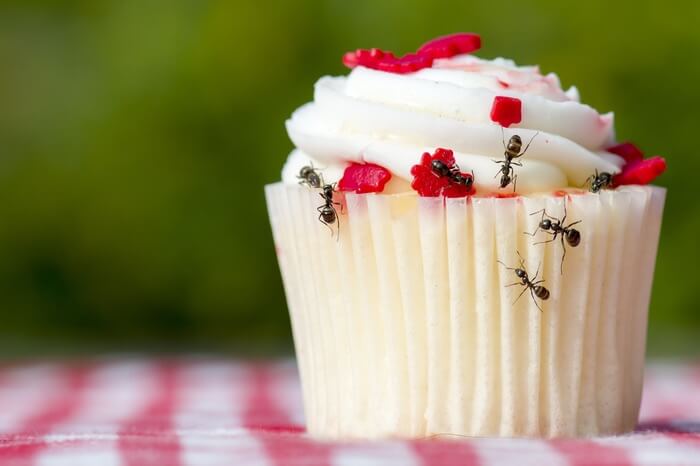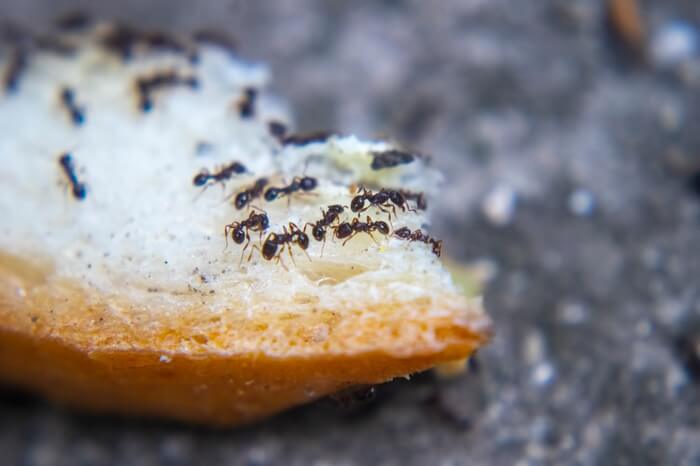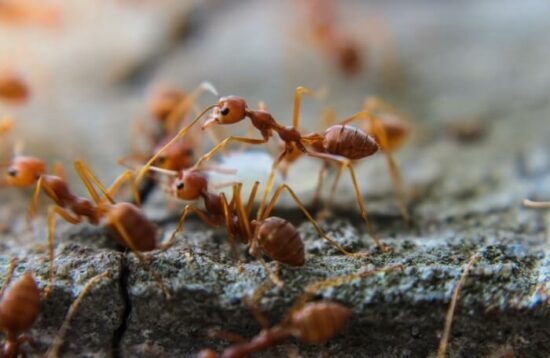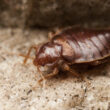There’s a lot of misinformation out there when it comes to the topic of ants carrying and spreading disease. Some people say that these insects are extremely dirty and pose a serious health hazard, while others claim that they aren’t a serious problem.
So, do ants carry disease or not?
This guide will answer that question and provide important background information to help you better understand the risks.
Table of contents
Do Ants Carry Disease?
When most people think of disease-carrying pests, they imagine roaches and rats. Large-scale disease outbreaks caused by mosquitos and other biting insects come to mind as well.
But do ants carry disease?
Despite their small size, ants are fully capable of carrying diseases and contaminating food in your home. While an ant’s impact on human health isn’t as massive as other medically important bugs, their ability to transmit pathogens exists nonetheless.

Several species have a reputation for causing health issues in humans. Pharaoh ants, a widespread species that homeowners encounter regularly, are particularly troublesome.
- Kills common household ants including acrobat, crazy, ghost, little black, odorous house, pavement, and other sweet-eating ants
- As worker ants discover the bait, they share it with the rest of the colony to eliminate them all
- You should see a significant decrease in the number of ants visiting the bait stations within just a few days
- Place stations near areas where you’ve seen ant activity
These pests are often found in commercial facilities and places where food handling is standard. Infestations occur in hotels, restaurants, and grocery stores all the time. Not only that, but they often appear in hospitals and critical care facilities.
Pharaoh ants are attracted to many things, including the body fluids from vulnerable hospital patients. Many studies show the potential that ants have to spread disease within hospitals. Some reports even highlight the ability of certain ants to carry bacteria that resists antimicrobial treatments!
Quick Tip: It’s not just pharaoh ants you have to worry about. All of the typical household ants can carry diseases, parasites, and fungi into your home. That includes the pavement ant, the carpenter ant, the sugar ant, and more.
Potential Diseases
While the chances of getting sick from ants are relatively low compared to other insects, your risks increase as ant populations grow and colonies spread.
Ants can spread a slew of different diseases and germs. Here are the most common.
Bacterial & Viral Diseases
Ants are known to carry viruses and disease-causing bacteria. Usually, the spread occurs inadvertently as the insect makes its way around filthy environments. These bugs have no qualms with trudging through bacteria-filled spaces.
In fact, the insects thrive in them and often find food there!
Unfortunately, that behavior can lead to many issues down the line. The moment that an ant becomes exposed to harmful bacteria, they become a huge risk moving forward. Ants readily carry bacterial and viral pathogens, spreading them to any surface they encounter.
Staphylococcus and Streptococcus bacteria are often brought into homes and commercial properties through ants. Staphylococcus is a group of bacteria that can cause everything from pneumonia to heart valve infections.
Many people who encounter this bacteria will suffer from staph infections, which could manifest themselves as boils, skin infections, and MRSA. Staph is incredibly contagious and quite problematic in hospitals or other vulnerable locations.
Streptococcus can wreak havoc on your health, too. The bacteria can cause innocent issues like sore throat and mild sinus infections, but it can also create significant problems like organ damage, toxic shock syndrome, or even necrotizing fasciitis.
Quick Tip: The truth is that bacterial and viral infections are unpredictable. Because ants can carry and spread diseases anywhere, the severity of the resulting diseases varies dramatically. It all depends on how those tiny organisms react with your body.
Fungal Diseases
Ants can carry fungal spores into your home just as easily as they transmit bacteria. An ant’s relationship with fungi is complex. Some rely on it to survive while others have built-in defense mechanisms to prevent it from harming their health.
For the most part, fungi won’t be carried by common household ant species too much. It’s nothing more than a nuisance that they shake off as they reach their destination.
Unfortunately, that can mean a significant spread to human-occupied spaces. Many types of fungus can affect your health.
The good news is that most fungal issues aren’t life-threatening to healthy individuals. They can, however, be a problem for those who have a compromised immune system. People suffering from autoimmune disorders are the most at-risk to the fungal infections ants inadvertently cause.
Foodborne Illnesses
Thanks to their penchant for finding food, ants can carry all kinds of food-borne diseases! Once again, it all comes down to how they migrate. Ants are naturally dirty creatures that will walk on disgusting surfaces without missing a beat.
- Kills common household ants including acrobat, crazy, ghost, little black, odorous house, pavement, and other sweet-eating ants
- As worker ants discover the bait, they share it with the rest of the colony to eliminate them all
- You should see a significant decrease in the number of ants visiting the bait stations within just a few days
- Place stations near areas where you’ve seen ant activity
When they do that, they collect pathogens and germs. Then, they walk onto food and spread those pathogens to humans.
What kind of diseases do ants transmit via food? Unfortunately, they’re capable of carrying all of the news-worthy strains. We’re talking about organisms like Salmonella, E. coli, Clostridium and Shigella.

Salmonella and E. Coli are the most recognizable diseases. The former is caused by bacteria that invade the intestinal tract.
Symptoms can vary wildly from person to person, but most suffer from extreme pain, diarrhea, and fever. In severe cases, the bacteria can enter the bloodstream and kill you.
The same goes for E. Coli infections. Most issues that stem from E. Coli are treatable, but some strains can lead to life-threatening secondary symptoms like kidney failure or hemolytic uremic syndrome.
Both of these disease-causing pathogens cause disease outbreaks and product recalls pretty frequently. But, you may be at risk of encountering them yourself if you have ants in your home!
Asthma & Respiratory Illness
Believe it or not, but ants can also trigger respiratory problems in certain people. Studies show a link between ants and respiratory health issues like asthma.
It’s rare for ants to trigger asthma attacks. They’re not like dust mites or other airborne ants. But, those who have high sensitivity to allergens may experience trouble.
Those studies revealed that ants could cause bronchoconstriction even without a sting, so it’s vital to address infestations if you have someone in your home who is at risk.
Misc. Allergies
Finally, we have general allergies and potential reactions. This is one of the most common health problems that people encounter when dealing with ants, even though it’s not technically a disease that they carry.
Bites and stings happen all the time. Those stings result in nothing more than mild irritation, subtle inflammation, and itchiness for a vast majority of people. Even when several ants go into attack mode, the resulting injuries are typically easy to treat and nothing more than a nuisance.
Those who are ultra-sensitive to venom and allergens, however, may experience even worse results.
In those cases, stings can cause painful lesions and the potential of anaphylaxis. You’re most likely to see these effects when bitten by an ant with more potent venom. For example, fire ants are known to create worse symptoms than garden-variety species.
How They Spread Disease & Bacteria
Ants can carry disease in many different ways. As we mentioned earlier, it usually happens because of cross-contamination.
Cross-contamination occurs when an ant moves through pathogen-filled environments. Unfortunately, that happens pretty frequently because of this insect’s lifestyle.
Ants are constantly searching for food and water. They’re not very picky when it comes to what they eat. As long as it meets their basic nutritional needs, worker ants will make their way to it and bring the food back to the colony.
Quick Tip: The food can be anything from grease to sweets. Where do ants encounter those foods most? Usually, they find it in garbage cans, bathrooms, sinks, and other dirty places.
Ants navigate through the most questionable areas to get to the food. You can encounter them in waste pipes, toilets, and more. But that’s once they get inside.
Before they entered your home, there’s a good chance that those pests trudged through even filthier spaces. Ants have a knack for consuming dead animals, sifting through feces, and more (picking up germs as they go).
When they eventually get inside, ants usually gravitate towards the kitchen (even the kitchen sink). That’s where most of your household food is, so it’s the area that attracts scout ants most. The moment they walk on your floors and countertops, they’re spreading bacteria and viruses.
Don’t let their small size fool you. Ants are fully capable of carrying disease and pathogens into the areas where you store, prepare, and eat food. It doesn’t take much for bacterial cultures to get out of hand and contaminate food either!
You’d be surprised by how much of an impact a lowly ant can have on you and your family’s health.
What’s The Chance Of Them Making You Sick?
There’s a genuine possibility that you can get sick from whatever disease an ant carries into your home.
However, the chances of that happening are pretty low. If you clean regularly, you’re already doing a lot to mitigate those risks and prevent the spread of disease and food contamination.
But your risks do increase the more extensive the ant population gets. You may also encounter more issues if you live in a rural area surrounded by more bacterial breeding grounds.
All that said, you’re more likely to get sick from other insects over an ant. Mosquitoes and roaches are the worst offenders. Compared to those bugs, ants are relatively harmless.
The threat exists, but it’s not something you should have to worry about too much as long as you don’t have a major ant infestation on your hands.
Final Thoughts
Ants carry disease, but it’s not as bad as you may have feared. As long as you do a good job cleaning and preventing infestations, the chance of them spreading disease, germs, or contaminating food is pretty low.
If you have any questions that weren’t addressed in this guide, you’re more than welcome to send us a message and ask!



